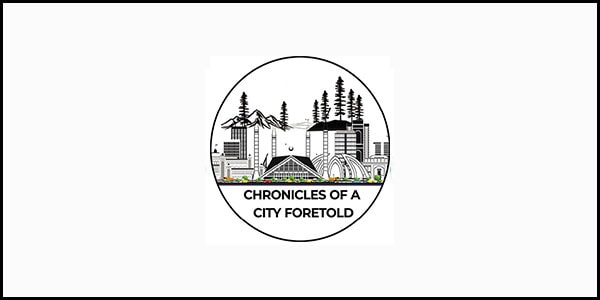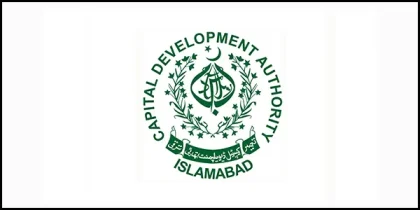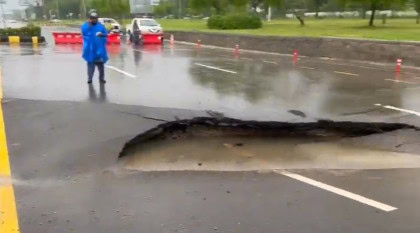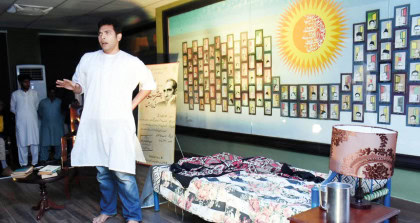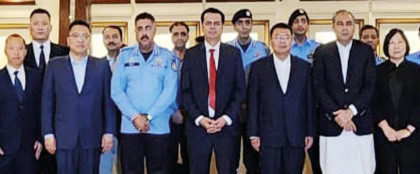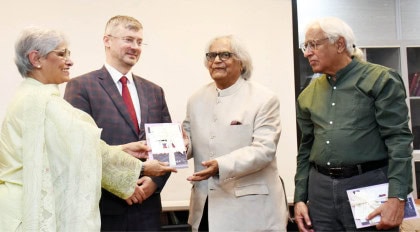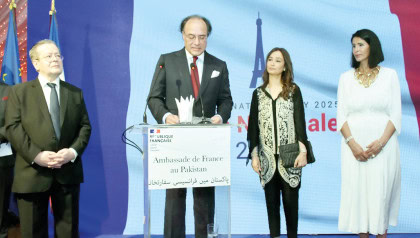A glass of milk or a white lie!
Urban Bystander
In Islamabad, where fountains dry and flyovers bloom, where every street has a sermon but no sewage plan, governance is a careful choreography: raids, reports, posters, press conferences.
And then, tea is served. With milk, or at least something white, liquid, and usually approved by no one except the bacteria.
Each day, millions consume it, loose or boxed, buffalo or “fortified”, often with the quiet knowledge that what they drink might nourish their doubts more than their bodies.
The regulators know. The vendors know. The consumers know. And no one blinks.
Purity, here, is a moral hazard. My friend Rafique wasn’t asking for miracles. Just one glass of milk that wouldn’t smell. One that wouldn’t curdle before his father, a retired science teacher whose lungs now wheezed like abandoned harmoniums, could take his medicine. One that wouldn’t bring back the rash on his daughter’s arms. But in Islamabad, even a glass of milk has become an unreasonable request.
It began innocently, the way tragedies often do. A neighbourhood milkman, full of morning cheer and empty assurances, handed him a jug of lukewarm milk with a smile: “Pure as Maulvi sahib’s sermons.” Said with such conviction that when the milk curdled later that evening, Rafique briefly suspected his own boiling technique.
What followed was not six months, but a near-religious odyssey. Markets offered boxed miracles with names like Milkara, Buffaluxe, and Farm Ultra. Their packaging boasted omega-rich, vitamin-injected promises in imported font. The fine print suggested hope.
The milk boiled well. The taste, however, reminded his daughter of the paintbrush she chewed in pre-school. “This one has extra calcium,” Rafique offered.
“Smells like detergent,” muttered his father after the first sip.
Next came organic farms in Chak Shahzad, where cows listened to qawwali and posed for Instagram. Milk came in glass bottles sealed with twist-off caps, priced like small electronics. It boiled, foamed, and separated, like a coalition government. The rash returned.
A cousin from Kallar Syedan promised deliverance. Village buffalo. Hand milked. Family honour. The milk smelled real, looked rich, and foamed perfectly, until it didn’t. A gentle inquiry revealed the truth. “Maybe my associate added a little whitening powder,” Kareem admitted sheepishly. “For texture.”
Of course. The texture of betrayal, not unlike our governance reforms: well-advertised, ill-prepared, and mysteriously absent by lunchtime.
In another country, this would have sparked protest. Here, it’s just Wednesday.
Each morning, the Islamabad Food Authority (IFA) wakes up with noble intent. Their vans roll out with thermal scanners and moral outrage. Raids are launched. Litres are dumped. Fines are calculated with the same gravity used to price samosas at a government canteen. Officials wear waistcoats lined with triplicate pens, speak in acronyms, and proudly declare that 70% of milk in the city is adulterated, but under control.
In a celebrated operation in 2024, the IFA tested 20,000 litres of milk. Fourteen thousand were found adulterated and dumped. The remaining six thousand were waved through like diplomatic luggage. Just last month, a godown in F-11 was raided. Oxytocin vials were found hidden inside detergent boxes, and thousands of litres of chemically fortified dairy were drained. Victory was declared in bold fonts.
Next day, the same shelves brimmed with even shinier milk.
In May 2025, 5,400 litres of water-diluted milk were seized in Rawalpindi. Fines issued totalled Rs. 345,000, a figure lower than the cost of a single newspaper ad praising food safety.
Even packaged milk, once the urbanite’s last defence, fell from grace. Between 2016 and 2018, the Supreme Court launched a rare act of civic hygiene, ordering tests on all major packaged milk brands.
The results were damning: detergent, formalin, industrial chemicals. Four brands were banned outright. For context, formalin is used to preserve corpses. Apparently, also shelf life.
Reforms followed, packaging changed. But the lesson lingered: even the box cannot pasteurise deceit.
Today, consumers are left with no clear choice. Loose milk is chemical roulette. Packaged milk is corporate opacity in vanilla essence. One comes in a bucket, the other in a box. The lie is uniform. Only the font changes.
Meanwhile, somewhere beneath the surface, the real regulators sip quietly, or so narrates Babloo, Head of Zone-III Aerial Vigilance, with the solemnity of one who’s seen too much from above.
He speaks of White Matter Enterprise, a thriving, unregistered syndicate of microbial governance, headquartered somewhere between Taramari and Nilore, where the clouds stall and the drains forget their destinations. Officially invisible, biologically unstoppable, they preside over every drop of milk entering the capital. Led by the sinister Chairman Clot, AKA Streptococcus aureus. His cabinet includes Listeria Bibi (Minister of Messaging), Oxytocin Bhai (Logistics and Enhancement), and the eternally grinning Sal Monella (Chief of Consistency). Together, they run a shadow supply chain so effective, no human inspector has ever caught a whiff. Their motto? “If it foams, it’s fresh.”
Their operations are mythic. The Nosy Mynah, while sipping spilled chai in Sitara Market, was overheard telling Babloo: “They’ve introduced an ISO-certified foam index.” “At least someone’s standardising things,” sighed Babloo.
But even White Matter isn’t the darkest part of this tale.
The real tragedy is the silence.
Citizens who would rather pray over a saucepan than question a supply chain. Enforcement that tries to catch speedboats with bicycles. Institutions reduced to Social Media graphics and weekend raids.
Apathy, like bacteria, thrives in lukewarm places.
And so, Rafique continues his quest. Every morning, he boils. Every evening, he hopes. Not because he believes the milk will improve, but because not boiling feels like surrender. Just for a glass of milk, comrade?
Yes. Because in that glass is everything: governance, poverty, ethics, enforcement, conscience. And every morning, as it foams and folds into a soft ruin, we all drink it anyway.
(The writer can be reached at bystanderinthecity@gmail.com)

